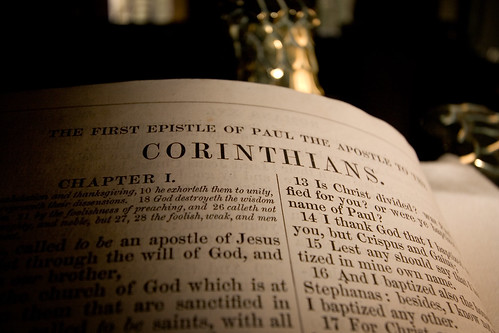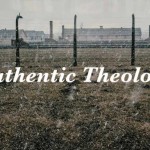We run our website the way we wished the whole internet worked: we provide high quality original content with no ads. We are funded solely by your direct support. Please consider supporting this project.
On Biblical Inerrancy

Matthew Kirkland via Compfight
In this essay, Peter Enns explains his views on Biblical inerrancy and the complexities encountered as evangelicals attempt to define the term.
From the essay:
Speaking as a biblical scholar, inerrancy is a high-maintenance doctrine. It takes much energy to “hold on to” and produces much cognitive dissonance. I am hardly alone. Over the last twenty years or so, I have crossed paths with more than a few biblical scholars with evangelical roots, even teaching in inerrantist schools, who nervously tread delicate paths re-defining, nuancing, and adjusting their definition of inerrancy to accommodate the complicating factors that greet us at every turn in the historical study of Scripture.
(Disclaimer: We link to various articles and blog posts not necessarily because we are in 100% agreement with them, but because we think they offer a perspective worth thinking about)
Related Reading

“You” Means “Y’all”
Mrs Logic via Compfight Justin Hiebert over at Empowering Missional wrote a piece last week titled The Bible isn’t for you. Justin rightly points out that our individualistic mindset has caused us to misread huge portions of the Bible. He challenges us to read the Bible as a community rather than as individuals. It seems…

The Evangelical Heart
qthomasbower via Compfight Rachel Held Evans posted recently about The Scandal of the Evangelical Heart. Citing a comment by John Piper (“It’s right for God to slaughter women and children anytime he pleases. God gives life and he takes life. Everybody who dies, dies because God wills that they die.”) she notes that when we approach the Bible in…

N.T. Wright on the Whole Sweep of Scripture
Here’s a really fine video message from N.T. Wright on how to read Scripture. So many of the misunderstandings we take away from Scripture happen when we pick out a verse here and there and neglect the whole story. We hope this will bless you and encourage you to “press your nose against the window.”

Reflections on the Supremacy of Christ (Part 1)
In my previous post I argued that the Bible tells a story in which the culminating event – the coming of Christ – reframes everything that preceded it. Though it is all inspired, not everything in it should carry equal weight for us. Rather, everything leading up to Christ, including the portraits of God, must…

Tragedy Strikes and Coherence Goes Out the Window
I encourage you to read Aurora shooting inspires various perspectives on God and belief, written by Electa Draper and published on the front page of the Denver Post Monday. The article shows how differently believers process tragedies, and illustrates the centrally important role one’s picture of God plays in these responses. For today, I’d like…

Authentic Theology
So much theology does not do justice to the reality of the world. Any theology that’s going to claim to be authentic must be done on the edge of a mass grave of gassed children. If we can’t state our theology there, then it’s useless. We must never block out the pain of this world.…
